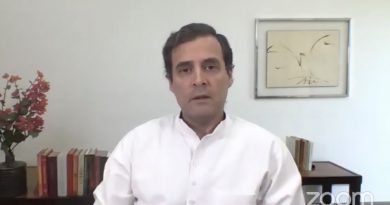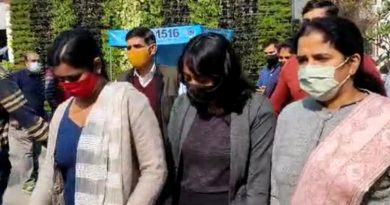| |
|---|
News Desk: It’s an old trick, and one that rulers have used since times immemorial.

When things aren’t going well, shift the focus from your own incompetence and blame the most vulnerable. It, therefore, comes as no great surprise that as the COVID-19 pandemic ravages the national capital, TV channels sympathetic to the government have now started blaming the horrific state of affairs in the city on “farmers blocking oxygen trucks coming into the city.”
The farmers, who have been camped on Delhi‘s borders for the last five months, are doing no such thing. If anything, they have for the longest time now, parked their tractors and set up their dwellings on the sides of the roads, leaving ample space in the middle of the highways for trucks, ambulances and cars to pass through freely.
And true to their nature, they are now reaching out to migrant workers who, fearing a long lockdown, are fleeing Delhi by droves. Not only are they hosting langars for them and feeding them at departure points like Anand Vihar Bus Terminal near Ghazipur border, but they are also inviting them to come and stay in their own tents and shelters. Stay with us as long as you need to, those without a proper roof over their own heads are telling the migrant workers. We are here for you.
Has the government, entirely unwittingly, just birthed a new symbolic alliance between farmers and migrant workers? Time will tell. But the matter of immediate concern is the farmers’ response to COVID-19.
Have they no fear of it? Or do they, like some COVID-19-deniers, not even believe in its existence?
“Of course the threat of COVID-19 is real,” Jasbir Kaur, a leader of the Punjab Kisan Union at Tikri border tells me. “This is a heartbreaking situation and we cry for those who have lost loved ones to this terrible disease. We also know what death is like. But you have to understand that the threat to our very existence because of the three farm laws is just as real! Do you think we want to be here? We are forced to live on the road because this is hond ki ladaaee (‘fight for existence’) for us.”
Kaur says there are some at the protest who think there is no such thing as COVID-19 and that this is a manufactured crisis. “We tell them otherwise, but because the government has lied so much on so many issues, they simply refuse to believe what it says about the pandemic. There is a massive trust deficit.”
When asked about masks and COVID-19 protocols, Kaur says, “If anyone will fall sick and show symptoms, we will, of course, isolate that person and give them whatever medical help is needed. As far as wearing masks, many of the men here are Sikhs and it is difficult for them to wear masks because of their turbans, but they do cover their faces with scarves and cloths when they move around. We are doing what we can, but you have to understand that a lot of the protocols which are easy for you to follow in your homes, are difficult for us to follow because we are living on the road. ‘Working from home’, for example, is the privilege of those with means, not the poor. But we are doing what we can to stay safe and keep others safe.”
Her voice rises a bit as she says, “It is important for all of us to remember that we in India are suffering not just from a disease but from the failure of a system to look after its people! The government should tell us why it did not make sure enough beds and oxygen cylinders were in place for this wave of the pandemic. Why does it have Rs 8,400 crores to buy planes for Modi ji and Rs. 20,000 crores to build a new parliament and a new Central Vista, but not enough money to spend on hospital beds, vaccines and oxygen cylinders?”
Kaur pauses for a bit and asks an important question that many seem to have missed, “Why is the onus of public safety on us? Shouldn’t it be on the government? If they are as concerned about everyone’s welfare as say they are, they should take these laws back, and we can all go home.”
The farmers know they are in a Catch-22 situation. They also understand that a lot of urban Indians – including those in the media – will not understand the depth of their compulsion to continue their protest despite the mayhem and devastation around them.
Elaborating on this, Kaur says, “People ask us indignantly why we are still on protest, given the conditions in Delhi. They do not understand that if the virus does not kill us, the three farm laws certainly will. Either way we are in trouble. But it is difficult to explain our existential crisis to those whose existence is fundamentally secure.”
Being men and women of integrity, there is little doubt they will stay their course, knowing they are not only fighting for their own survival, but ultimately for the survival of the country they feed.
The onus is now truly on the government to defuse the crisis that is coming. The very least the rest of us can do is at least not condemn the farmers for being in the situation they are in.



